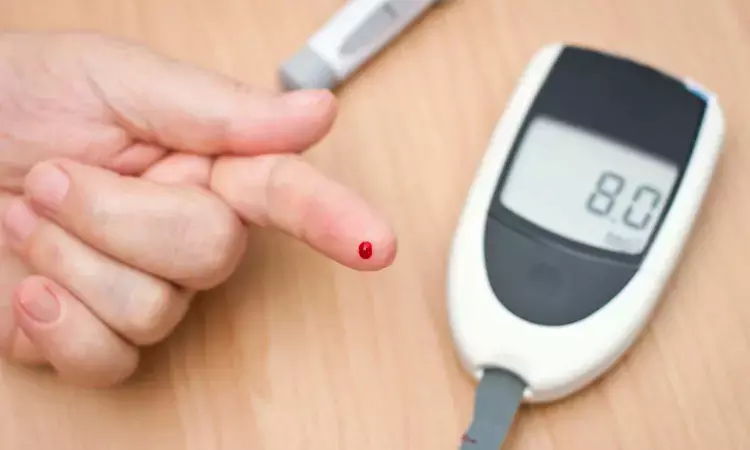- Home
- Medical news & Guidelines
- Anesthesiology
- Cardiology and CTVS
- Critical Care
- Dentistry
- Dermatology
- Diabetes and Endocrinology
- ENT
- Gastroenterology
- Medicine
- Nephrology
- Neurology
- Obstretics-Gynaecology
- Oncology
- Ophthalmology
- Orthopaedics
- Pediatrics-Neonatology
- Psychiatry
- Pulmonology
- Radiology
- Surgery
- Urology
- Laboratory Medicine
- Diet
- Nursing
- Paramedical
- Physiotherapy
- Health news
- Fact Check
- Bone Health Fact Check
- Brain Health Fact Check
- Cancer Related Fact Check
- Child Care Fact Check
- Dental and oral health fact check
- Diabetes and metabolic health fact check
- Diet and Nutrition Fact Check
- Eye and ENT Care Fact Check
- Fitness fact check
- Gut health fact check
- Heart health fact check
- Kidney health fact check
- Medical education fact check
- Men's health fact check
- Respiratory fact check
- Skin and hair care fact check
- Vaccine and Immunization fact check
- Women's health fact check
- AYUSH
- State News
- Andaman and Nicobar Islands
- Andhra Pradesh
- Arunachal Pradesh
- Assam
- Bihar
- Chandigarh
- Chattisgarh
- Dadra and Nagar Haveli
- Daman and Diu
- Delhi
- Goa
- Gujarat
- Haryana
- Himachal Pradesh
- Jammu & Kashmir
- Jharkhand
- Karnataka
- Kerala
- Ladakh
- Lakshadweep
- Madhya Pradesh
- Maharashtra
- Manipur
- Meghalaya
- Mizoram
- Nagaland
- Odisha
- Puducherry
- Punjab
- Rajasthan
- Sikkim
- Tamil Nadu
- Telangana
- Tripura
- Uttar Pradesh
- Uttrakhand
- West Bengal
- Medical Education
- Industry
Blood sugar level at gestational diabetes diagnosis linked to harmful outcomes for mothers and babies: Study

The higher the blood sugar level in pregnant women when first diagnosed with diabetes, the higher the risk of complications around and after birth, according to research presented at the 26th European Congress of Endocrinology in Stockholm.
For every 5mg/L above the diagnosis threshold, the risk of newborns having low blood sugar levels, or a large birth weight, rises by 9% and 6%, accordingly, while mothers have a 31% higher risk of diabetes after birth. The findings suggest that high-risk women with gestational diabetes should be classified further to limit these complications for both mothers and newborns.
Gestational diabetes — a condition in which women have elevated blood sugar, or glucose, levels during pregnancy — affects around 20 million pregnancies worldwide and poses increased health risks for both mothers and their babies. For example, mothers are more likely to develop type 2 diabetes and to give birth to especially large babies who face a high risk of birth injuries or even obesity later in life. Women are diagnosed with gestational diabetes if their fasting (pre-meal) blood glucose levels are above 92 mg/dL in the first trimester or their 2-hour oral post-meal glucose levels (OGTT) in the second trimester is above 153 mg/dL.
In this study, researchers from the Tâmega e Sousa Hospital Center in Portugal analysed data on blood sugar levels and birth complications of 6,927 pregnant women, aged 30-37 years old, who carried one child and were diagnosed with gestational diabetes between 2012 and 2017. The researchers found that for every 5mg/L increase in their blood sugar levels, there was a 9% higher risk of low blood sugar (hypoglycemia) and a 6% higher risk of large birth weight (large for gestational age) in newborns and a 31% higher risk of maternal high blood levels (hyperglycemia) after birth.
“While it is not surprising that high glucose levels are associated with these adverse outcomes in mothers and newborns, our study shows for the first time how much increase in risk there is with 5 mg/dL of increase in the mother’s blood glucose levels when first diagnosed with gestational diabetes,” said co-lead researcher Dr Catarina Cidade-Rodrigues.
Dr Cidade-Rodrigues continued: “The magnitude of elevated risk can be calculated with our measurements and, in practice, could be used to identify and stratify women at higher risk of developing these complications.”
“We now want to evaluate if there is a benefit in further stratifying these high-risk women with gestational diabetes, who will need to be more closely monitored and to whom pharmacological interventions can be carried out appropriately. This may help reduce complications during labour and in newborns and prevent future diabetes in these women.”
Blood sugar level at gestational diabetes diagnosis linked to harmful outcomes for mothers and babies
MEETING
European Congress of Endocrinology
Dr Kamal Kant Kohli-MBBS, DTCD- a chest specialist with more than 30 years of practice and a flair for writing clinical articles, Dr Kamal Kant Kohli joined Medical Dialogues as a Chief Editor of Medical News. Besides writing articles, as an editor, he proofreads and verifies all the medical content published on Medical Dialogues including those coming from journals, studies,medical conferences,guidelines etc. Email: drkohli@medicaldialogues.in. Contact no. 011-43720751


